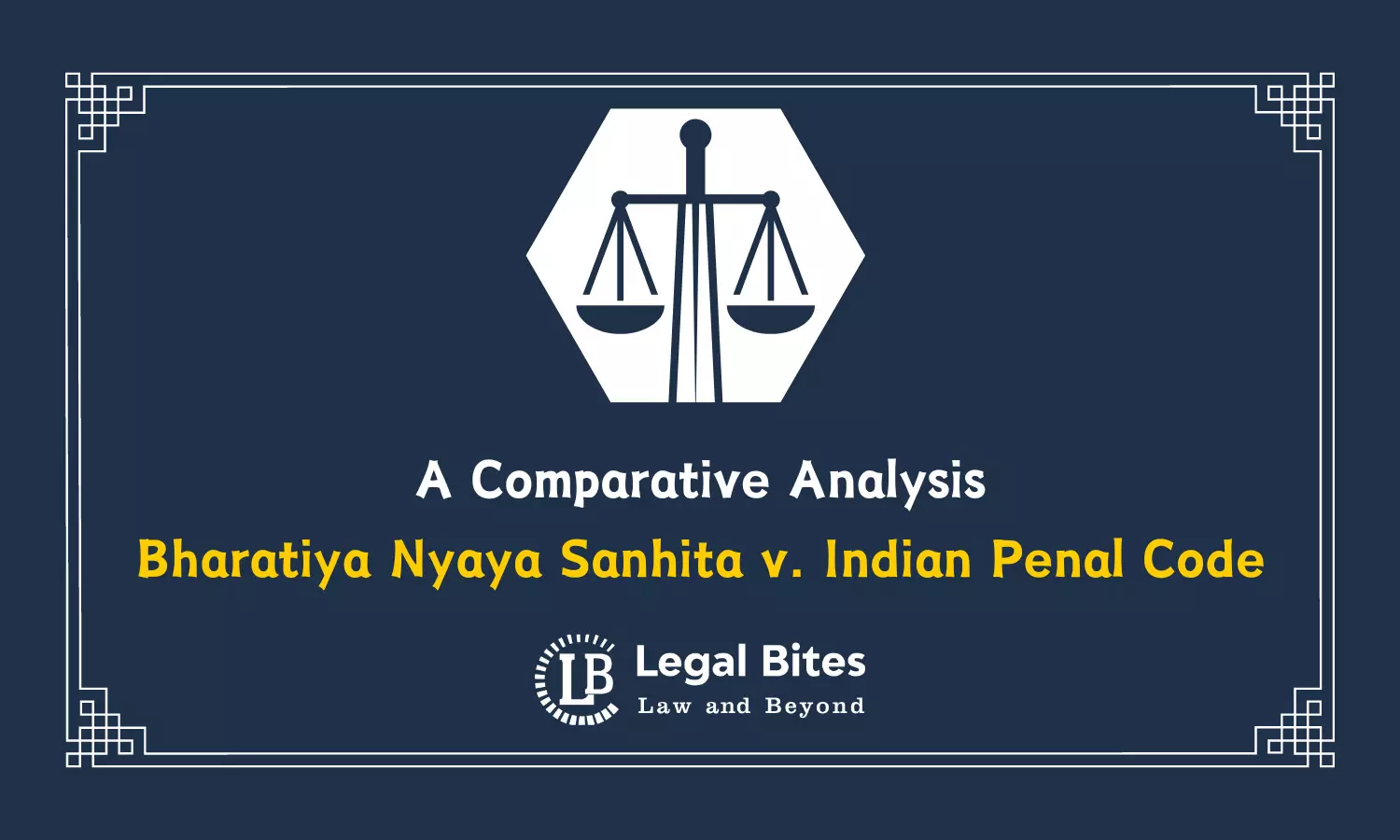A Comparative Analysis: Bharatiya Nyaya Sanhita v. Indian Penal Code
The article analyzes the replacement of IPC provisions by the Bhartiya Nyaya Sanhita and its impact on contemporary legal practices.

The article analyzes the replacement of IPC provisions by the Bhartiya Nyaya Sanhita and its impact on contemporary legal practices.
Introduction
The Bharatiya Nyaya Sanhita (BNS) 2023, which replaced the existing Indian Penal Code of 1860 ("IPC"), was approved by the Parliament during the recently concluded winter session.
The bill, which was passed by the Parliament on December 20th and 21st, 2023, and received Presidential assent on December 25th, 2023.
Under this, there are only 358 sections in BNS, compared to 511 sections in IPC. Further, 31 new crimes have been added to the BNS, and 19 provisions of the IPC have been removed.
Moreover, for 33 offences, the maximum sentence (i.e. imprisonment) for jail time has been increased, for 83 crimes, fines have been increased, and for 23 crimes, a mandatory minimum punishment has been put in place, 'Community Service' has been incorporated as a punitive measure for six minor offences.
Features of Bharatiya Nyaya Sanhita
Some of the changes made to the Sanhita are as follows:
Definition Clause
Under IPC, there was no definition clause instead there were interpretation clauses from Sections 6 to 52A. Under the new Act, these sections are grouped together and part II has definitions separately.
A new definition of "child" and transgender has been added to Section 2 (3) and (10) under the new Act. Aside from this, the meaning of "court" in Section 2(5), "document" in Section 2(8), which now includes electronic and digital records, "movable property" in Section 2(21), and other terms have been changed.
Punishments
Under Section 53 of the IPC, there were different fines. These have now been moved to Section 4 of the BNS, and community service is now also a punishment.
The BNS doesn't define "community service," but in simple terms it indicates:
community service is a service that the court can order a prisoner for punishment that helps the community, and the prisoner won't get paid for it. However, it would have been better if it was made clear what kinds of tasks would be considered community service.
Abetment
Section 48 of the BNS deals with Abetment outside India for offence in India:
A person abets an offence within the meaning of this Sanhita who, without and beyond India, abets the commission of any act in India which would constitute an offence if committed in India.
Rape
- Earlier it was defined under Section 375 of the IPC, but it is now in Section 63 of the BNS. The controversial exception for rape in a marriage, called Exception 2, is still in place. However, the age requirements have been changed. The wife must now be at least 18 years old in order to be able to agree for this exception, up from 15 years old.
- Punishment for rape has been given under Section 64 of BNS.
- But, even after a lot of discussion, the rules against rape are still not gender-neutral. To this day, they still say that only women can be victims and only men can be offenders. The new Act talks about transgender people, but it doesn't say anything about them in the parts that talk about rape.
- People who have sex with a woman while lying or promising to marry her can be fined and sent to prison for up to ten years under the new law (Section 69). This only applies if the person is not planning to keep the promise of marriage.
- As of now, Section 70 of the BNS provides punishment for gang rape has been changed.
Each of those persons shall be deemed to have committed the offence of rape and shall be punished with rigorous imprisonment for a term which shall not be less than twenty years, but which may extend to imprisonment for life which shall mean imprisonment for the remainder of that person’s natural life, and with fine
Hiring, Working with, or Involving a Child to Commit a Crime
Under the BNS there is a new crime added to Section 95. Anyone who hires or helps a child to commit a crime is punished by this law. Imprisonment for three years and a maximum period of ten years along with fine are punishment for this offence. If the crime is carried out, the person will be punished as if they had committed the crime themselves. The meaning of this part includes hiring, engaging, or using a child for pornography or sexual exploitation.
Mob Lynching
If five or more people work together to kill any individual due to the reason of their race, caste, community, sex, place of birth, or any other similar reason, they will all be punished with death or life imprisonment , and they will also have to pay fine. This has been added to Section 103(2) under the new law to prevent the offences of mob lynching.
Death by Negligence
.Another new Section 106(2) deals with cases where the criminal leaves the accident without telling a police officer or magistrate about it afterward. This is a very serious crime that can get the person ten years in prison and a fine.
According to Section 106 (1) A person causing death through rash or negligent acts, not amounting to culpable homicide, can be sentenced to up to five years in prison, along with a fine. If the act is committed by a registered medical practitioner during a medical procedure, the punishment may include imprisonment for up to two years, in addition to a fine.
Section 106(2) deals with cases where the criminal leaves the accident without telling a police officer or magistrate about it afterward. This is punishable offence for ten years along with fine.
As hit-and-run accidents happen so often in the country, Section 106 (2) covers them and makes sure they are reported right away.
Attempt to Murder
Earlier attempt to murder under IPC Section 307, has now, modified under Section 109 of the new Act, anyone who commits an act with the intention or knowledge that, if it resulted in death, would constitute murder, faces imprisonment of up to ten years, along with a fine; if harm is inflicted, the punishment could include life imprisonment or the aforementioned penalties.
Petty Organised Crimes
Section 112, deals with petty organized crimes. It says:
Whoever, being a member of a group or gang, either singly or jointly, commits any act of theft, snatching, cheating, unauthorised selling of tickets, unauthorised betting or gambling, selling of public examination question papers or any other similar criminal act, is said to commit petty organised crime.
Terrorism
Under Section 113 of the new Act adds a new section. The Act has a definition for what constitutes a terrorist act and there are various punishments relating to terrorism like for commission, abetment, inciting or supporting this offence or setting up a camp to train terrorists or taking people to do terrorist acts, being a member of an organization that does these things, hiding or harboring a terrorist, or having money from terrorist activities.
Grievous Hurt
Under Section 117(3) of the new Act that talks about causing disability to commit grievous harm on purpose. Other than this, S.117(4) of BNS makes it illegal for five or more people to act together and cause grievous harm to someone due to their race, caste, community, sex, place of birth and prescribes imprisonment of either description for a term which may extend to seven years along with fine.
Sedition
The old Act defines Sedition under Section 124A and now which has been removed. However, a new section has been added Act 'endangering sovereignty, unity and integrity of India'.
Breaking the sovereignty, unity, and integrity of India is illegal under Section 152 of the BNS. This includes doing so on purpose, whether it's through spoken or written words, signs, visible representations, electronic communication, financial means, or any other way.
The explanation for this section makes it clear that it is not illegal to say negative things about the actions or decisions taken by the government in order to get them changed legally, as long as the comments are not about or meant to start the activities mentioned in this section.
Conclusion
Therefore, it can be seen as that the new Act has tried to get rid of all British colonial laws as they are still harsh in some places. There was a need of the amendments to the Act which can made the new laws as gender neutral and new definitions as well as offences. The women related offences has been kept at priority and put into the starting chapters so that their crimes are taken into harsh punishments. But still there are laws which had not focused towards men in the country. Hence, this new Act (BNS) has taken a new step to introduce the flaws previously unaddressed in the old Act.
References
[1] K D Gaur, Textbook on the Indian Penal Code, 8th Edition
[2] Key Highlights of the three new criminal laws introduced in 2023, Available Here
[3] The Bharatiya Nyaya Sanhita, 2023, Available Here
[4] Indian Penal Code, 1860, Available Here

